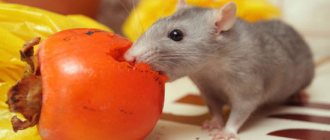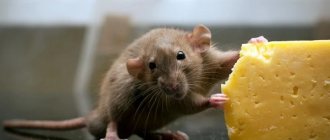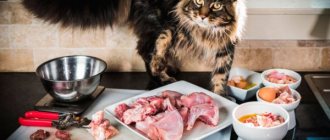It is very important for rat owners to know what to feed their pets. Of course, in pet stores you can find food for complete nutrition of a rodent. However, sometimes it is worth pampering your pet with a variety of foods. In this case, you will need to research all available information to ensure that the food is suitable for your rat.
In this article, we will look at different categories of products and their safety for rodents. If the food you are interested in is not on this list, look online for more information. Always check food is safe for your pet before feeding. You cannot know if a food is toxic or poisonous to a rat.
Prohibited Products
For the most part, rats can be given regular food, but there are exceptions:
- Dry peanuts or beans - they contain substances that eliminate the beneficial properties of enzymes and vitamin A necessary for the body to process protein and starch, and can also cause blood cells to stick together;
- Green bananas - destroy enzymes responsible for the absorption of starch;
- Potato eyes and skins contain solanine, known for its toxic properties;
- Raw tofu – it contains many bacteria that are not found in cooked tofu;
- Orange juice - not suitable for consumption only by males, can weaken the kidneys;
- Apple seeds - they contain a low concentration of cyanide, which is dangerous for pets;
- Artichoke – inhibits protein processing in the rat's body;
- Beans - destroys enzymes and vitamin A;
- Beet tops - can cause ailments of the urinary system and provoke the formation of stones in the kidneys and bladder due to the large amount of oxalates;
- Chocolate – contains too much sugar.
Treats for rodents
There are foods that rats love most, including walnuts, hazelnuts, and seeds. Unsweetened cookies are also a delicacy, as is a piece of fresh young carrots, boiled pasta or even a cracker. The pet store has special treats - drops. They are made in different flavors from different ingredients.
You cannot spoil rats with such food; once a day will be enough. Drops are allowed to be given no more than 6 pieces per day. These nutritional supplements are like candy—sweet, but provide no benefit. In addition, not every manufacturer takes a responsible approach to the drop production process and is not always ready to indicate the true composition of the product.
You also need to please your animal with treats correctly, so choose products that do not contain sugar and salt, and should not contain flavorings or spices. You can give dried fruits or nuts every day. Most individuals cannot deny themselves the pleasure of eating corn flakes, but they should be without sugar and salt.
Diabetics have unsweetened cookies in their diet, which can also be classified as delicacies that these animals adore. Food for small children will also please the animal, for example, puree. You can make it from fruits and vegetables yourself, since natural products will bring more benefits than store-bought ones.
Not everything that seems tasty to a person is suitable for a rat; this applies to meatballs with sauce and other foods from the table. Lightly dried bread will be much better for your pet. If it contains bran, muesli or cereals, then the pet will be in seventh heaven.
If the animal has become a full-fledged member of the family, then you can please it with a home-made treat. An excellent and healthy option at the same time is porridge made from cereals and vegetables or fruits. In the summer it can be zucchini, perhaps pumpkin; in winter it’s easy to get by with a frozen mixture from the supermarket.
Vegetables are baked or steamed, cereals are steamed or lightly boiled. Add a small amount of sunflower oil and a quail egg to the mixture. A rat will not be able to refuse a steamed omelet, but you should add water, not milk, to it. Steamed meatballs with vegetables are also an excellent alternative to a tasty dinner for an animal, but in this case it is best to take beef.
Among crustaceans, rats feast on gammarus, which is added to ready-made buckwheat.
You need to know that baby rats do not always readily eat fresh vegetables, but they really love baked ones.
Vegetables and greens
You can feed your rat the following vegetables and herbs:
- Cabbage is the most common vegetable to feed to rodents, as it can be given every day;
- Spinach – good for growing rat pups, give once a week;
- Broccoli – improves overall health, recommended twice a week;
- Cauliflower – pets love to eat this vegetable raw, feed it twice a week;
- Asparagus – has a good preventative effect against anemia; you can feed it to your rat three times a week;
- Carrots – contains many vitamins, often used for training;
- Cucumber – you can take it with you on the way to the veterinarian instead of water.
- Basil – give one or two leaves.
Most pet rats happily eat vegetables and greens raw. Cooking vegetables significantly reduces the concentration of micronutrients in them, so it is very important to add raw vegetables to your rodent's diet. But, if your rats specifically require boiled vegetables, then it would be better to remove this food from their diet completely.
Vitamin complex
For normal functioning of the body, rats need vitamins:
- To replenish vitamin A, rats eat milk, fishmeal and egg yolk. It affects reproduction and growth.
- Thiamine, or vitamin B1, is found in baker's yeast, dairy products and grass flour. It affects the functioning of the nervous system and the metabolism of carbohydrates in the animal’s body.
- Riboflavin, or vitamin B2, is found in grains and sprouts. He is responsible for the reproductive system.
- Pyridoxine, or vitamin B6, is found in grass flour, yeast and bran. Thanks to it, the risk of conjunctivitis and various skin diseases is reduced.
- Cobalamin, or vitamin B12, is found in fishmeal. Its source is also shellfish. Replenishes the lack of aminocarboxylic acids. Add to the diet in small quantities.
- Sources of ascorbic acid (vitamin C) include root vegetables, greens and fresh vegetables. It is given as a measure to prevent colds.
- Vitamin D is found in fish oil. It regulates the exchange of phosphorus and calcium in the body.
- Tocopherol, or vitamin E, is found in green food and sprouted grains. It is responsible for the functions of the reproductive system.
- The main sources of vitamin K are vegetable oil, green leafy vegetables, as well as liver and dairy products. Blood clotting depends on it.
If there is a lack of vitamins in your pet’s menu, you should buy a special vitamin complex in a pet store. To select vitamins for your animal, you need to contact a veterinarian. The selection depends on the individual characteristics of the domestic rat.
A properly designed nutrition menu will help kitty rats stay healthy for many years.
To choose food for a pet, the owner must pay attention to its characteristics. Rodents eat everything they are given, however, not all food is good for the animal.
Nuts
Nuts are full of healthy fats, protein and fiber. They can be given to pets as a healthy treat. However, they should only be offered to rats in small quantities, as they contain too much fat. But the exception is chestnuts, which are low in fat and are considered the most suitable nut for rats.
We suggest adding several types of nuts to your pet's diet and alternating them - treating your rat to one of the types once a day. The following nuts are the best choices:
- Walnuts;
- Brazil nuts;
- Almond;
- Pecan;
- Pistachios.
Chestnuts are the only type of nut that can be given in large quantities and combined with other nuts.
Alternative to apples
So your rat doesn't like apples. Fortunately, because rats can eat many different foods, this is not a problem. Here are some alternatives you can give your rat as a treat:
- Grape
- Bananas
- Blueberry
- Tomatoes
- Some types of salad
- A pineapple
- A small amount of bread
- Strawberry
- Pumpkin
- Carrot
Keep in mind that this list is not complete, it is only intended to give you some ideas. If you want an expanded understanding of what rats can eat, check out the article on rat nutrition.
Cereals and grains
Grains and cereals contain large amounts of carbohydrates and vitamin E. The most affordable option for adding such food to a rat’s diet is to buy rodent food that contains a variety of grains mixed together. However, often the pet refuses specific grains, so it is easier to prepare a mixture based on the animal's preferences.
These cereals are suitable for rats:
- Wheat;
- Barley;
- Oats;
- Millet.
It is also worth adding grains to the mixture. Choose from the following types of seeds:
- Linen;
- Sunflower;
- Pumpkin.
Before feeding, the seeds should be washed thoroughly. Seeds for rats can be germinated at home. A rodent should be given no more than 15 seeds per week.
What to feed a little rat
A mother rat feeds her offspring with milk. However, there are times when she does not want to do this. In this case, responsibility for the life of the offspring will fall on the shoulders of the animal owner. To feed baby rats, you can purchase a lactating female at a pet store or feed the babies yourself.
To feed babies, you can use a pet milk replacer. Dry soy baby formula diluted with a small amount of goat's milk or condensed milk is also perfect.
Important! Liquid formula can be stored in the refrigerator for no longer than 12 hours. The formula will need to be warmed up slightly
To feed your offspring, it is better to use an insulin syringe with an internal catheter at the tip. You can also take a pacifier made from pieces of cotton fabric
The milk mixture will need to be warmed up a little. To feed your offspring, it is better to use an insulin syringe with an internal catheter at the tip. You can also take a pacifier made from pieces of cotton fabric.
After each meal, you should pour boiling water over the items. To avoid the development of enteritis in young animals, it is worth giving small rats a course of Biovestin.
Below you can find detailed information regarding the principle of feeding animals by week:
- In the first 7 days of a rodent's life, it is worth feeding them every 120 minutes. liquid diluted milk formula. Closer to the 7th day of life, it is worth diversifying the menu with milk formula, to which a small amount of dry ground grain feed has been added;
- in the second week, the mixture for rodents can be diluted to a consistency that will resemble liquid sour cream. You will need to drink the mixture every 3-4 hours;
- in the third week of life, you can pour the food mixed with the mixture into a bowl. From 23.00 to 6.00 you can not feed the offspring;
- At 4 weeks, animals can be switched to dry food. From the 30th day of life, rodents should be given food that is familiar to adults. If desired, rat pups can be fed milk until the end of the second month of life.
Babies will need to be fed the mixture every 2 hours.
What menu should kids have? When choosing a diet for little rats over 4 weeks old, you should give preference to:
- dry grain;
- boiled chicken, turkey and fish fillets;
- cottage cheese;
- dill and cilantro;
- bananas;
- apples;
- wheat sprouts;
- oats;
- chicken egg yolks;
- boiled chicken and turkey liver.
Under no circumstances should children be allowed to indulge in:
- cucumbers;
- champignons;
- garlic and onions;
- tomatoes.
Note! When rat pups are fed milk by their mother, they can only be fed by the 21st day of life. It is best not to wean babies early from breastfeeding, which has a positive effect on strengthening the animal’s immunity.
Organizing the right diet for your beloved rodent is important; this will allow you to raise the animal healthy. It is important to give up the desire to pamper your four-legged friend with table scraps such as sweets and sausage, as this can provoke the development of various pathologies of internal organs
Fruits and dried fruits
Fruits are very beneficial for rats. However, they contain sugar, so it is important not to overdo them. Preference should be given to berries, as they are filled with nutrients, but contain the least sucrose. But there are other fruits suitable for rats. Among them:
- Apples are good for a rodent’s heart; they can be given no more than three times a week;
- Bananas are easily digested by the rat’s body, give them dried, fresh and baked;
- Plums - help rodents grow smooth fur, feed them three times a week;
- Peaches - famous for their anti-inflammatory effect, a rat can be given half the fruit at a time;
- Kiwi – helps prevent anemia and infections;
- Cherries – support the pet’s brain function, remove the pits before feeding;
- Grapes - can slow down aging, but contain a lot of sugar, so give in minimal quantities;
- Pears – useful for weight loss in large rats;
- Watermelon – can be given daily.
It is best to feed your pet rat fresh fruits and berries. Fruits that have been dried at home are also an excellent option. If you decide to purchase dried fruits in a store, check the sugar content on the packaging.
Mushrooms
If you use mushrooms that are edible to humans, they are also safe for rats. It is recommended to serve mushrooms cooked to kill any microbes that may be on them after processing.
Additionally, it is important to feed mushrooms to rats in moderation. A small amount of mushrooms will not harm your rat and can be a tasty and healthy snack. Mushrooms have also been shown to help prevent tumors and infections in rats, so it might be a good idea to give them as a treat occasionally.
But if you feed your rat a lot of mushrooms, it can cause many side effects. Excessive feeding of mushrooms can cause gas, diarrhea and some other digestive problems in your rat. For this reason, it is best to feed mushrooms to rats in moderation.
This will diversify your rat's diet and prevent many health problems.
Feeding a sick rat
From the very beginning of the appearance of a rodent in the house, you should decide on the name of the products, which, if necessary, can be replaced with others. The disease is common to many people and rats are no exception.
If your pet is unwell or has a sudden allergic reaction, you need to think about a special diet:
- Infection. A set of products for infectious diseases should consist of eggplant, plum, banana and mustard leaves. Don’t forget to add raspberries and cranberries during this period. Onions and garlic will also come in handy.
- The appearance of neoplasms (tumors). This problem is not uncommon in domestic rodents, then for prevention and treatment, the existing set of food products should be replenished with broccoli cabbage. She is best able to cope with this disease. Do not forget that cabbage should be either boiled or steamed.
- Joint disease (arthritis). This disease can very often be observed in domestic rodents. Only a veterinarian can help with this, but ginger root and a clove of garlic will help ease your pet’s joint pain.
Cheese and other dairy products
Dairy products and eggs can be added to a rat's diet. The pet is allowed to give quail eggs once a week. They must be hard-boiled first. Natural yogurt with a low fat content is also suitable as a treat for a rodent. However, make sure that no flavorings or other additives have been added to the product.
You should be especially careful with full-fat milk and cheese. It is recommended to give a very small amount of cheese. Also, the best type of cheese for rats is the one made from soy. Never feed blue cheese to your pet; it is toxic to pets. You can also supplement your rodent's diet with fish oil, which is very beneficial for small animals.
Criterias of choice
If you still want to treat your little rodent with a treat, you need to understand the right choice of fruit.
Read also: How to make designs on nails with a needle?
The banana should not contain any green coloring, otherwise you will feed your pet solid starch. There should be small black spots on it, which means the fruit is ripe. You can also determine ripeness by smell. A yellow banana will have no odor, but the aroma of the spotted yellowish fruit will not let you pass by.
Remember, the main diet of rats: cereals, grains, dairy products and lean meat. Banana is a fruit that provides vitamins to animals. Protein is necessary for full functioning and health. It supports immunity and develops bones and muscle tissue.
Meat
Meat and fish are recognized as the main sources of protein. It is also very important to introduce hearts, kidneys, liver and tubular bones of birds into the diet of a domestic rat. Feed your pet only meat and fish that are not too fatty. The best feeding option is pre-boiled meat, cut into small pieces. Never give your animal high-temperature food; wait until the meat cools down. It is worth noting that frozen meat is not suitable for feeding rats. An excellent addition to a healthy rat diet would be low-fat broth without various spices and additives.
Special food
While shopping for standard food, you can also look for products specifically formulated for pet rats.
They are usually a food made from nutritious plant pellets. These loose seed mixtures can provide a balanced diet for your pet, but only if your rat eats the entire contents of the food. However, rodents often eat only the most delicious food and leave half of the food at the bottom of the bowl. Therefore, rat food in the form of a block is an excellent option. The pet will not be able to selectively eat a certain part of the food, and food will always be available to it.











